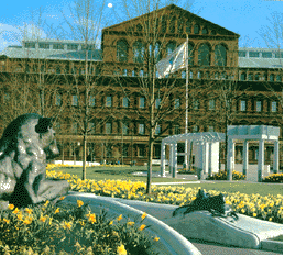Captain Samuel H. Chapman
Fifth Iowa Volunteer Infantry

Judiciary Square: Site of National Law Enforcement Officers Memorial

Samuel H. Chapman was already a forty-one year old veteran of the Seminole and Mexican wars when the War Between the States erupted. On July 15, 1861, he was appointed Captain of Company B of the Fifth Iowa Infantry. A resident of Newton, Iowa, he had been born in Ohio. Due perhaps to his relatively advanced age, he did not remain with the regiment long. He resigned his commission on December 2, 1861, having served less than six months.
Perhaps through political connections with Senator Kirkwood, Chapman was able to secure a comfortable Civil Service position after the war. Although the story is not completely flattering, the following account from The United States Park Police: A History is fascinating.
The United States Park Police has a long history. Just how long is a matter of interpretation. Although the present organization dates from after the Civil War, its functional lineage may be traced nearly to the beginnings of the national capital in the 1790s…The first official reference to watchmen elsewhere on the public grounds appears in 1866. In that first year after the Civil War B.B. French, the Commissioner of Public Buildings, responded to a congressional resolution that he identify his employees and attest that none were Confederates or Confederate sympathizers. His list contained 30 Capitol police, 5 Capitol watchmen, 2 watchmen at the White House, and 2 watchmen in Reservation 2, the Smithsonian Grounds. The last two, in the area now better known as the Mall and Washington Monument grounds, were also listed as "laborers."Two successive appropriations acts that year provided for three more watchmen at the Smithsonian Grounds and one at Franklin Square…
Notwithstanding their newly acquired police powers, the park watchmen of the 1880s were still occupied largely with other duties. The Chief of Engineers characterized their function in his 1886 annual report:
They are not watchmen, in the common acceptation of that term, but are really park-keepers, doing daily the work of gardener, laborer, and watchman. During the season of active operations they are on duty daily, including Sundays, from 8 am until 8 pm, with only time for their meals. The parks under their charge are the handsomest in the city, and are visited by large numbers of citizens and strangers. The entire time of these watchmen is devoted to making their parks as beautiful as possible,,,There were no set knowledge, education, or experience requirements beyond prior military service in these early years, and not surprisingly the watchmen varied in their capacity and fitness for the job. Samuel H. Chapman, the watchman at Judiciary Square, was an elderly veteran of the Seminole, Mexican, and Civil wars. During the last of these he had served as a captain in the 5th Iowa Infantry but "was compelled to resign and go home a broken down man," he wrote Sen. Samuel J. Kirkwood of Iowa in January 1880. He sought the senator's intercession to help him secure "an easier place" on account of his age and poor health, but Secretary of War Alexander Ramsey told Kirkwood that there was no easier place for Chapman in the park watch.
Remaining at Judiciary Square, Chapman prompted public complaints for his inattention to duty. "Instead of sweeping off the pavement… he sits by the stove in his villa and reads his newspaper," wrote "a taxpayer" who regularly traversed the square. "A very estimable old gentleman no doubt, but wholly unsuited for the duty assigned him." Another citizen's letter suggests that Chapman may have confused his assignment with that of another sort of watchman: "Mr. Chapman instead of attending to the duty of Watchman is employed at a table in the Watchman's House in Judiciary Square mending and repairing Clocks and Watches almost constantly during the business hours of the day, each and every day." Confronted with this complaint, Chapman confessed to some minor watch repairing on the job--for Public Buildings and Grounds officials at their request.His resignation in April 1881 must have occasioned general relief.
Despite his less than glorious performance as Park Policeman, Captain Samuel Chapman certainly deserves our recognition for his military service both during the Civil War and in the years which preceded it.

Return to the Fifth Iowa Infantry Personnel
Return to the History of the Fifth Iowa Infantry